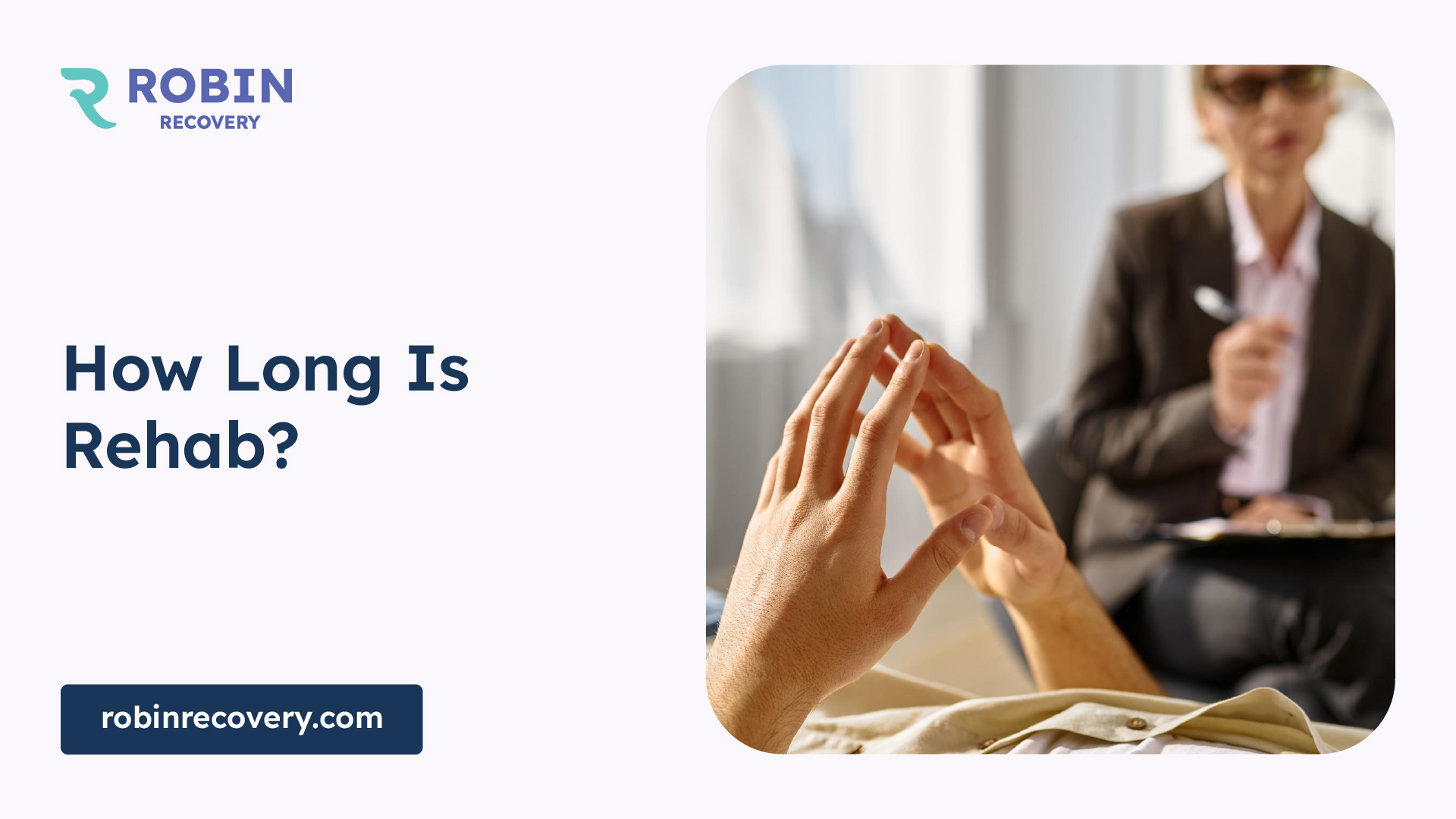How Long Is Rehab?

Understanding Rehab Duration
One of the most common questions posed by those considering rehab is, "how long is rehab?" The answer to this question is not straightforward, as the duration can vary widely based on a number of factors.
Overview of Rehab Length
Rehabilitation programs, designed to help individuals recover from substance abuse, addiction, or physical injuries, can vary greatly in length. According to Red Oak Recovery, addiction treatment typically lasts 30 days, but some programs can last 60 or 90 days, and individuals with severe addiction may require several months of treatment.

Programs can be classified as short-term or long-term rehab. Short-term rehab programs typically last around 28 to 30 days, while long-term rehab programs can extend beyond 90 days.
The length of outpatient rehab programs can also differ, with short-term programs lasting a few weeks to 30 days, and long-term programs extending up to 90 days or longer.
Rehab programs for athletes can range from several weeks to months, depending on the type and severity of the injury, as well as individual factors such as overall fitness level and adherence to the rehabilitation plan.
Factors Impacting Rehab Duration
The duration of rehab is influenced by several key factors, which can include the severity and type of addiction or injury, the individual's overall health and fitness, and their engagement and adherence to the treatment plan.
Furthermore, the type of program (inpatient or outpatient), the goals set by the individual and their treatment team, and the resources available can all play a key role in determining how long rehab lasts.
It's important to note that while the duration of rehab is a factor in recovery, it is not the only factor to consider. The quality of care, the type of treatment provided, and the individual's commitment to recovery are equally, if not more, crucial to achieving successful outcomes.
In conclusion, it's clear that the question, "how long is rehab?" does not have a one-size-fits-all answer. It's a complex issue that depends on a variety of factors. The focus should always be on finding the right treatment plan that meets the individual's unique needs and supports them on their journey towards recovery.
Short-Term Rehab Programs
When understanding the duration of rehab, it's essential to differentiate between short-term and long-term programs. Here, we focus on short-term rehab programs, which are typically the first step for many seeking help.
Typical Duration
Short-term rehab programs typically last around 28 to 30 days, although the exact duration can vary depending on individual needs and the type of addiction. For example, short-term alcohol rehab programs typically last anywhere from 28 to 30 days.
Short-term drug rehab programs also typically last around 30 days, but the duration can extend based on the severity of the addiction and the individual's specific needs.
Effectiveness of Short-Term Programs
Short-term rehab programs are often an effective starting point for treatment. They can provide structure and support as individuals begin their recovery journey. In fact, a 30-day program is a common initial goal for many, and it's often covered by many insurance companies due to its lower cost.
However, it's also common for individuals to extend their treatment beyond the initial 30-day program. For instance, many choose to continue their treatment in a local community intensive outpatient treatment program for an additional 45 days. This flexible approach allows individuals to benefit from a longer treatment period while adjusting to their everyday life [3].
Despite their shorter duration compared to long-term programs, short-term rehab programs can be a critical first step to recovery. They provide immediate care and support, equip individuals with coping strategies, and pave the way for extended treatment if necessary. Remember, the question of "how long is rehab" ultimately depends on individual needs and circumstances, and it's crucial to consult with healthcare professionals to determine the best course of action.
Long-Term Rehab Programs
When considering the question of "how long is rehab," it's important to understand that rehab programs can vary in length. Among these variations, long-term rehab programs represent a significant commitment and are often recommended for individuals with severe addiction or co-occurring mental health issues.
Extended Duration Explanation
Long-term rehab programs typically last from 6 to 12 months [4]. These extended rehab programs provide an intensive and comprehensive approach to addiction treatment. This longer duration allows individuals to work on the root causes of their addiction and explore the factors that contributed to their substance dependence.
The extended duration of these programs also provides the advantage of allowing more time for comprehensive treatment, therapy, and skill-building. This can significantly improve the chances of a successful recovery after leaving rehab, as individuals are equipped with the tools and skills necessary to maintain sobriety in the long term [6].
Success Rates of Long-Term Programs
Research has shown that longer stays in rehab (3 months or more) are more beneficial and have higher success rates compared to shorter treatment stays. One of the key reasons behind the success of long-term programs is that they provide an opportunity for individuals to cleanse their bodies of the addictive substance, gain a deep understanding of their addiction, and develop effective coping strategies.
Longer programs also offer more time for individuals to build trust with staff, open up about personal issues, explore the reasons behind their addiction, and work closely with trained addiction professionals. This comprehensive approach to treatment can significantly improve the chances of long-term recovery, making long-term rehab programs a valuable option for individuals struggling with severe addiction [5].
In conclusion, while the duration of rehab can vary significantly depending on individual needs and circumstances, research suggests that longer stays in rehab can lead to better outcomes. Therefore, when considering rehab options, it may be beneficial to consider long-term programs as a potential path towards recovery.
Individualized Rehab Length
When it comes to understanding "how long is rehab," there is no one-size-fits-all answer. The duration of rehab varies greatly from person to person, and is determined by several key factors.
Personalized Treatment Plans
The length of rehab is determined by various factors, such as the person's mental health, physical conditions, medical history, family dynamics, and severity of substance use. A personalized rehab plan takes these factors into account to ensure the individual receives the appropriate level of care and support [1].
Some inpatient stays can be short-term, lasting from 28 to 30 days, while others can be long-term, lasting for 60 days to 90 days or longer. The decision on the length of stay in a rehab program should always be individualized and based on a thorough assessment by healthcare professionals.
Figures courtesy Rehabs.com
Importance of Tailored Approaches
Implementing a tailored approach to rehab is not just about personalizing the length of the program. It also involves tailoring the types of treatments and therapies provided to meet the individual's unique needs. This allows the individual to work on the root causes of their addiction and explore the factors that contributed to their substance dependence.
Studies have shown that longer stays in rehab (90 days or longer) can be more beneficial and successful than shorter treatment. This is because longer programs provide individuals with more time to focus on their recovery and develop the skills necessary to maintain sobriety after leaving the rehab facility.
In conclusion, the length of rehab depends on the person's specific needs and circumstances. A thorough assessment by healthcare professionals and a personalized treatment plan are essential to ensure the individual receives the appropriate level of care and support throughout their recovery journey.
Optimal Rehab Duration
When seeking treatment for substance use disorders, a common question asked is 'how long is rehab?' The answer to this varies greatly depending on the individual's specific situation and needs. However, research provides some insights into the optimal duration of rehab programs for achieving successful outcomes.
Research Insights
Research suggests that longer stays in rehab, specifically those that are 90 days or longer, are more beneficial and have higher success rates compared to shorter treatment stays. A minimum of 90 days in a rehab program can significantly enhance the chances of successful recovery from substance use disorders.
These extended programs allow individuals to work on the root causes of their addiction and explore the factors that contributed to their substance dependence. They provide ample time for individuals to learn and apply new coping mechanisms, build healthier habits, and strengthen their commitment to a substance-free lifestyle.
For individuals with severe addiction or co-occurring mental health issues, even longer stays in rehab, such as 6 to 12 months, are often recommended.
Recommended Duration for Adolescents
For younger individuals, such as adolescents and young adults, the recommended duration of rehab differs slightly. It is suggested that a stay of 60 to 90 days is optimal for achieving the best outcomes in rehab.
The rationale behind this recommendation is that younger individuals often require a different approach to treatment. They may need additional support to help them navigate the unique challenges they face, including peer pressure, academic stress, and developmental changes. A slightly shorter, yet still substantial, stay in rehab can provide the necessary time to address these issues effectively while minimizing disruption to their education or normal routine.
In conclusion, the optimal duration of rehab varies greatly depending on the individual's specific needs and circumstances. However, research consistently indicates that longer stays in rehab typically yield better outcomes. Ultimately, the decision should be made in consultation with healthcare professionals who can provide personalized advice based on the individual's condition and circumstances.
Transitioning from Rehab
Once the primary phase of rehabilitation is completed, transitioning into a structured, supportive environment can greatly enhance recovery outcomes. This stage often involves step-down programs and continuing support structures.
Step-Down Programs
Step-down programs serve as an intermediate phase between inpatient rehab and return to regular life. After inpatient rehab, patients can step down into an intensive outpatient program (IOP) or a partial-hospitalization program (PHP). These programs provide continued support and structure, which are crucial for maintaining recovery. They may include individual therapy, group therapy, and medication management [5].
It is common for individuals to attend treatment for 30-45 days at a residential treatment program and then continue their treatment in a local community intensive outpatient treatment program for an additional 45 days. This flexible approach provides a continuum of care that aligns with the widely recognized 90-day treatment program recommendation [3].
Continuing Support Structures
Continuing support structures are another vital aspect of transitioning from rehab. After completing a residential rehab program, individuals often transition to an outpatient program for ongoing support and treatment. Outpatient programs can vary in duration and intensity. Some individuals participate in weekly sessions for several months, while others may continue with less frequent sessions for a longer period of time [7].
Participation in an aftercare program can also provide ongoing support and assistance in maintaining sobriety. These programs can vary in length and may include individual counseling, group therapy, and support group meetings.
Continuing care and support after rehab are crucial for maintaining long-term recovery. This can include participation in support groups, individual therapy, and regular check-ins with a healthcare professional. The duration of continuing care can vary depending on the individual's needs and progress in recovery [1].
As evident, while the question "how long is rehab" may seem straightforward, the answer involves a more complex journey that extends beyond the initial treatment phase. The transition from rehab and the subsequent support structures play a significant role in sustained recovery and should be carefully considered when planning treatment.
References
[2]: https://www.northstarbehavioralhealthmn.com/resources/how-long-is-rehab
[3]: https://www.addictioncenter.com/rehab-questions/how-long-does-treatment-take/
[4]: https://www.coniferpark.com/blog/how-long-is-rehab
[5]: https://rehabs.com/treatment/duration/
[6]: https://americanaddictioncenters.org/rehab-guide/how-long-rehab-last
[7]: https://www.samhsa.gov/find-help/national-helpline
[8]: https://www.redoakrecovery.com/addiction-blog/what-is-the-average-length-of-stay-in-drug-rehab/
